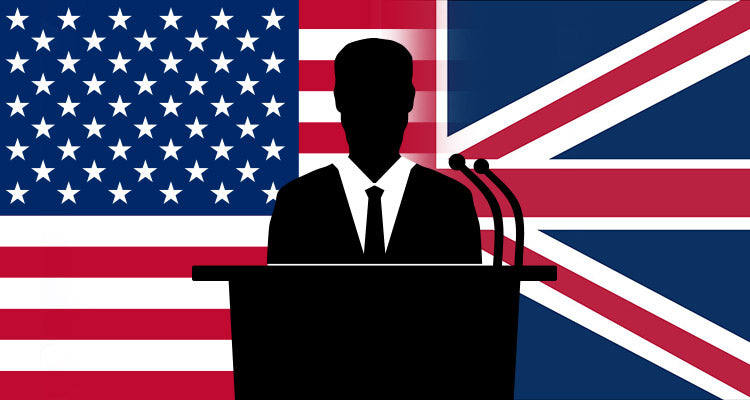Many health organizations and media outlets across the globe have been hostile toward vaping for various reasons. However, as evidence supporting the safety and efficiency of using e-cigarettes for tobacco cessation continues to accumulate, more political leaders are announcing their advocacy for safer alternatives to tobacco. Let’s look at who is voicing their support for e-cigs in an effort to change hearts, minds and policy.
Across the Globe Political Leaders are Showing Support for Vaping
In 2015, Public Health England became the first major government health organization to recognize the positive potential of e-cigs. Their widely cited report on the safety of vaping found e-cigs to be “95 percent less harmful than tobacco” based on multiple studies. PHE even encourages doctors to recommend e-cigs for their smoking patients as a safer alternative.
UK Prime Minister David Cameron echoed the organization’s statement in December 2015 when he told parliament, “I think we should be making clear that [e-cigs are] a very legitimate path for many people to improve their health and the health of the nation.” Cameron is a former smoker and the first world leader to speak out in favor of vaping.
Related: Breakdown of Public Health England’s E-Cig Review
Political Leaders for E-Cigs in the U.S.
American health organizations like the FDA and CDC have been much more hostile toward e-cigs than their U.K. counterparts; however, a few courageous government officials in the U.S. are pushing for logical e-cig legislation. For example:
- Iowa’s Attorney General, Tom Miller, issued a statement last year declaring, “e-cigarettes are dramatically less harmful than combustible cigarettes” and “switching [to e-cigs] may save [smokers’] lives.”
- Congressman Duncan Hunter of California wrote a controversial blog post entitled “Don’t Stifle Vaping” in which he bravely begins, “Yes, I vape.” Hunter goes on to detail his struggles with tobacco addiction and how e-cigs have helped him reduce his smoking habit. In January of 2016, Hunter spoke further about the issue during a public interview with The Smoke Free Alternatives Trade Association.
- Congressman Robert Anderholt of Alabama sponsored a bill to block the FDA from subjecting e-cig products to a burdensome pre-market approval process.
- Fred Upton, chairman of the House Energy and Commerce Committee, joined fellow representatives John Boehner and Kevin McCarthy in penning a letter to Health and Human Services Secretary Sylvia Burwell pleading for an extension of the FDA’s “grandfather date” for e-cigs. The currently proposed “grandfather date” exempts e-cigs made before 2007 from the expensive pre-market approval process; however, few e-cigs existed back then, and the majority of companies that make newer products would be unable to afford the financial hurdles to stay in business.
- Senator Ron Johnson (R-Wis.), Chairman of the Senate Homeland Security and Governmental Affairs Committee, sent a letter to the FDA shortly after the initial release of the deeming regulations in May of 2016. In his letter, Senator Johnson requested answers to a number of questions regarding the regulations, including whether or not the FDA determined how many businesses in the vaping industry would be affected by the rule; whether or not the FDA considered the “unintended consequences if decreased access to e-cigarettes leads to increased consumption of traditional cigarette and tobacco products”; and how the FDA’s regulation of e-cigarettes is “not a premature restriction on industry given the FDA’s admission that it does not have “sufficient data” about e-cigarettes to determine the effects on the public’s health.” The FDA’s failure to respond to the letter by the deadline of May 31st prompted the senator to send a second letter. After receiving an “insufficient response” Senator Johnson sent a third letter stating his concerns regarding statements made in the FDA’s response. One particular concern was how the FDA could regulate a product without sufficient evidence, as Johnson stated, “Rather than conduct research to better understand the effects of the product prior to regulating, the FDA chose to issue a rule without a proper understanding of the product itself“ and went on to say “the FDA’s action could result in a far-reaching regulation that fails to consider the regulatory impact on small businesses selling e-cigarettes, product innovation, and the public’s health.” The FDA was given a deadline of July 29, 2016 to follow up with the senator’s concerns.
Related: The FDA’s Controversial Grandfather Date
The Importance of Public Support for E-cigs
Debates surrounding e-cigs will not cease with conclusive scientific research. It will take time for the public to fully understand this relatively new technology. In the meantime, public figures can positively influence how people feel about vaping by telling their stories and explaining how e-cigs work. If you’re a leader in your community, make sure everyone knows how you feel about e-cigs and tobacco harm reduction.






